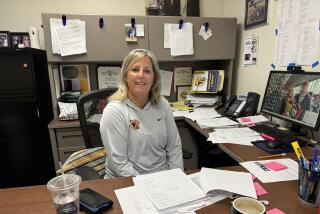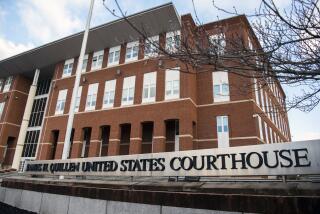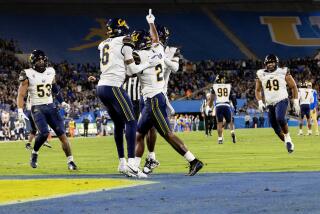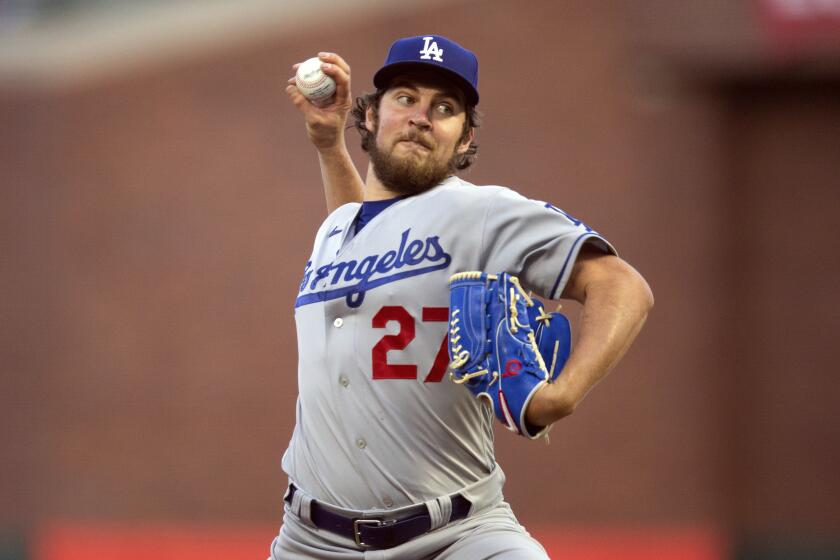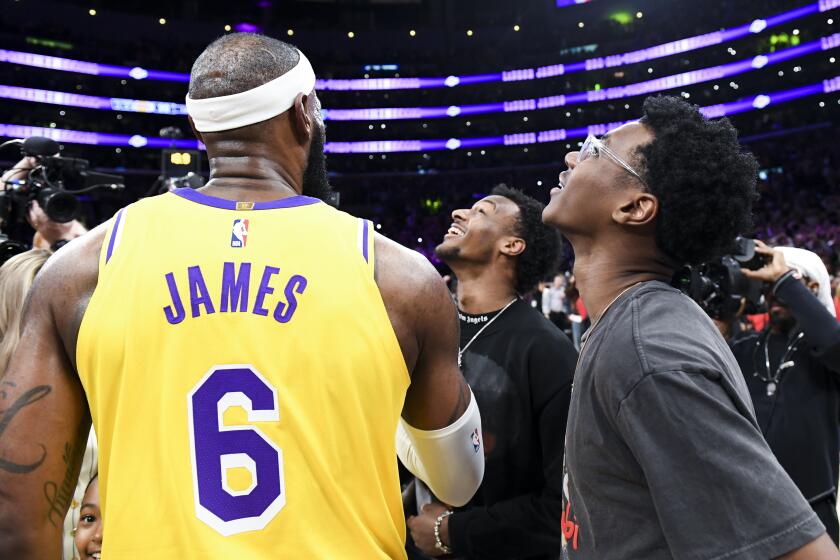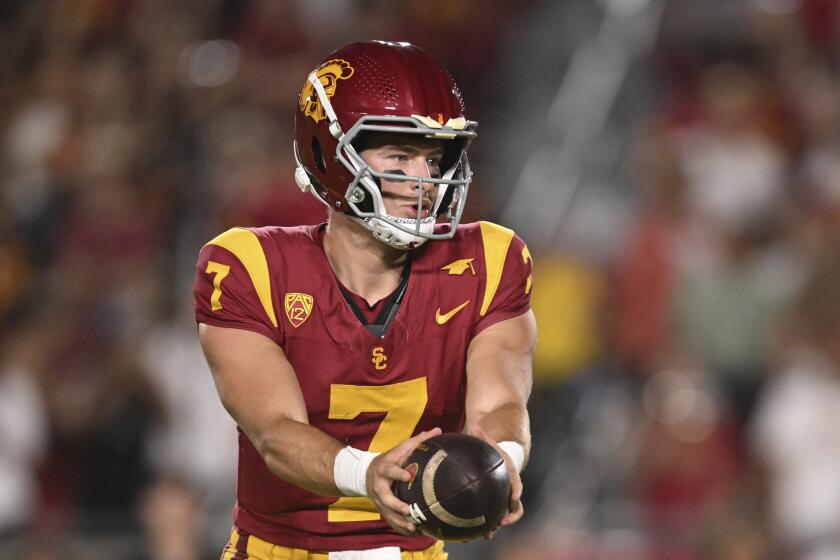Commission on College Basketball calls for reforms on one-and-dones, undrafted players
With college basketball reeling from scandal, an independent NCAA task force has called for widespread reform of a game that has become a multibillion-dollar business fraught with bribery and fraud.
The Commission on College Basketball focused much of its report on ending the “one-and-done” situation that has top players reluctantly enrolling in school for a season before jumping to the pros.
The 52-page document also suggests potential lifetime bans for coaches who cheat and a shift in the complex relationship with elite youth basketball and the shoe and apparel companies that pump hundreds of millions of dollars into the sport.
“The state of men’s college basketball is deeply troubled,” said the report, released Wednesday morning. “The levels of corruption and deception are now at a point that they threaten the very survival of the college game as we know it.”
Within hours of receiving the recommendations, NCAA leaders vowed to prepare legislation for a vote this summer, saying “we all will work together to get it right.”
But critics wonder if the report went far enough. They see a troubling inequity when comparing the value of scholarships to the players’ true market value.
“The fundamental problem is the players make more money for the schools than they receive in compensation,” said David Berri, a sports economist at Southern Utah University. “As long as that exists, you’re always going to have corruption.”
The NCAA formed its 12-member panel last fall after federal prosecutors charged 10 people — including four assistant coaches — in response to allegations of bribes and kickbacks meant to steer recruits to specific schools, agents and shoe companies.
USC, Arizona, Auburn and Oklahoma State have been ensnared in the wide-ranging FBI investigation. At Louisville, high-profile coach Rick Pitino lost his job amid allegations the program planned to funnel $100,000 to the family of a prized recruit.
These developments added to the sport’s long history of under-the-table payments and point-shaving. As the commission wrote, “the environment surrounding college basketball is a toxic mix of perverse incentives to cheat.”
Condoleezza Rice, the former Secretary of State, served as chairwoman for the panel, which included university administrators, retired coaches and former basketball stars Grant Hill and David Robinson.
There had been speculation the members might recommend more stringent reforms, such as borrowing a rule from college baseball that forces players who accept scholarships to remain in school for three years. There was also talk of opening the door for student-athletes to market their own names, images and likenesses.
“There should be an opportunity for the kids to make money through a legitimate process,” said Jim Lackritz, an emeritus sports business professor at San Diego State. “When the school is making all this money off players, why can’t we create a win-win situation where the kids can make some extra money too?”
After much discussion, Rice and her colleagues decided not to back the baseball option or any mechanisms for athletes to generate outside income, but said such issues could be revisited.
For now, the panel is asking the NBA and its players union to eliminate a 2006 rule that excludes young players from the pro draft until they turn 19 and are a year removed from high school graduation.
Athletes forced to spend a season in college are considered more vulnerable to breaking the rules.
“These uniquely talented elite players are the focus of agents, apparel companies, investment advisors, college coaches and others seeking to profit,” the report stated, adding: “If these players are allowed to turn professional, some of the pressure on the collegiate model will be reduced.”
It remains unclear if the NBA and its players will alter their eligibility rules, the league saying it “will continue to assess them in order to promote the best interests of players and the game.” Experts in sports business expressed skepticism about the scope of the problem.
“There’s only going to be, on an annual basis, four to eight kids who are good enough to go straight to the NBA,” Lackritz said. “It’s really a very small piece of the puzzle.”
In the meantime, the NCAA commission suggested more leeway for young athletes to test the professional waters.
The report proposed that high school players be allowed to consult with accredited agents to assess their future, a recommendation that met with some resistance from the National Federation of State High School Assns., which feared the change could “be disruptive to high school teams.”
After players move on to college, they should be permitted to enter the NBA draft but return to school if no team selects them and they do not sign a pro contract, the commission said.
The NCAA was also advised to beef up enforcement by creating an independent investigative unit.
A relatively small NCAA staff presently handles policing and relies on administrators from member schools to help adjudicate cases.
“Today’s current state … breeds cynicism and contempt,” Rice said.
The chairwoman called for stiffer penalties that, in instances of major violations, would ban teams from postseason play — and from the revenue-sharing that comes with the lucrative NCAA tournament — for five years.
Coaches who break the rules would face potential lifetime bans. The panel also pointed at universities, saying they should be required to sign off on annual reviews of their basketball programs.
“College presidents and high-level administrators cannot be permitted to turn a blind eye,” the panel stated.
Perhaps the most complicated portion of the report addressed college basketball’s worrisome relationship with shoe and apparel companies.
The ongoing FBI investigation has focused on shoe company executives and some schools that have contracts with the likes of Adidas, Nike and Under Armour. The commission recommended greater transparency regarding the multimillion-dollar agreements that schools have with these companies.
The issue dovetails with the role of elite youth basketball, a complex and largely ungoverned web of club teams and private tournaments that serve as recruiting grounds.
Shoe companies should have to disclose how much money they give to AAU and other private youth leagues, the commission said. The NCAA was urged to work with the NBA and USA Basketball to operate its own all-star tournaments where coaches could recruit during the month of July.
At the same time, recruiters would be banned from attending any non-scholastic events that are not sufficiently vetted.
“The corruption we observed in college basketball has its roots in youth basketball,” Rice said. “There are good programs — but there are too many that condone illicit behavior.”
Though the NCAA’s board of governors and board of directors immediately endorsed the recommendations, Rice warned that reform could take time.
“The current sad state of college basketball did not appear overnight and it will not be repaired quickly,” she said. “The work will not be easy, but we need to make a start — a bold one — to turn the ship in the right direction.”
UPDATES:
9:55 a.m.: This article was updated throughout with Times staff reporting.
This article was originally published at 5:55 a.m.
More to Read
Get our high school sports newsletter
Prep Rally is devoted to the SoCal high school sports experience, bringing you scores, stories and a behind-the-scenes look at what makes prep sports so popular.
You may occasionally receive promotional content from the Los Angeles Times.

